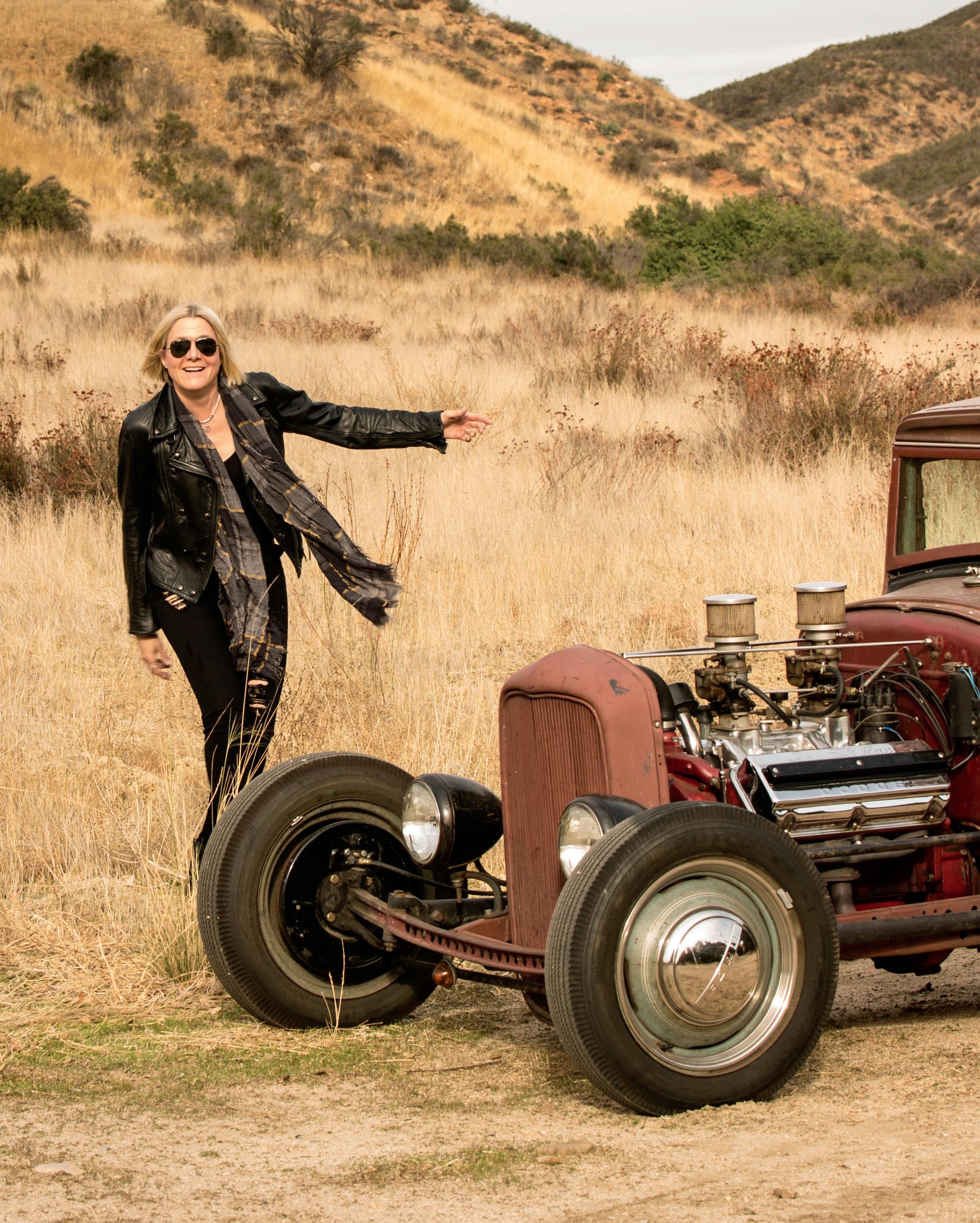
FIND YOUR HAPPY ALUMNI INTERVIEW WITH SEAN WIGGINS FALL PLAY THE LEGEND OF SLEEPY HOLLOW ALUMNI WEEKEND CELEBRATING THE CLASSES OF 2010 & 2011 DELPHIAN MAGAZINE Issue 125
FOLLOW @DELPHIANSCHOOL


GET IN TOUCH
We love feedback and news from our readers!
magazine@delphian.org
DELPHIAN SCHOOL
20950 SW Rock Creek Rd. Sheridan, OR 97378 800-626-6610 | 503-843-3521 | www.delphian.org
DELPHIAN MAGAZINE ONLINE
Experience the magazine on any mobile device! www.delphiannews.com/Issue125
HEAD OF SCHOOL Trevor Ott | EDITOR Rebecca Orthmann

GRAPHIC DESIGN Rebecca Orthmann
PHOTOGRAPHY Brandon Lidgard & Skyler Feilmeier


CONTENTS DELPHIAN MAGAZINE - ISSUE 125 ON THE COVER Alumna Sean Wiggins LEFT AND ABOVE: Students performing in the fall play 01 FROM THE HEAD OF SCHOOL What we expect from our students 06 ALUMNI WEEKEND Celebrating the classes of 2010 and 2011 10 ALUMNI INTERVIEW Interview with alumna Sean Wiggins 13 FALL PLAY The Legend of Sleepy Hollow 16 F ORM COMPLETIONS 17 ALUMNI NEWS © 2022 Delphi Schools, Inc.™ All Rights Reserved. Delphi Schools, Inc. admits students of any race, color, national or ethnic origin, religion, sex, sexual orientation, gender identity, marital status, physical or mental disability or age or any other classification protected under applicable law to all the rights, privileges, programs, and activities generally accorded or made available to students at the School. Delphi Schools, Inc. is licensed to use Applied Scholastics™ educational services. Applied Scholastics and the Applied Scholastics open book design are trademarks and service marks owned by Association for Better Living and Education International and are used with its permission. Grateful acknowledgement is made to L. Ron Hubbard Library for permission to reproduce selections from the copyrighted works of L. Ron Hubbard.
FROM THE HEAD OF SCHOOL

outside their ability to “think” you will be passed off to a real human being, which is my primary goal any time I use one. Sometimes though, it is hard to tell. They have gotten very good. Have any of you ever wondered if you are talking to a computer or to a real person? Me too.
In Tea, we talked about whether or not the ability to pass as a human in day-to-day conversation is a valid test of intelligence. We ended up discussing… what IS intelligence? That seems simple enough as a question, but a lot of the characteristics we think of as “intelligence” aren’t very useful in trying to understand whether or not a machine has achieved the sort of intelligence normally associated with a human being.
Are Jeopardy contestants intelligent? What about Jeopardy champions?
We have had computers for decades that can beat every Jeopardy champion, every time. Does that make the computer more intelligent?
Computers, as a general rule, win when competing against even the very best human beings in chess, checkers, and other games or activities with known, predictable rules, actions, and results.
Iwant to talk to you tonight about intelligence, and eventually, about how it relates to integrity. It will take me a while to get there. Bear with me.
I started thinking about this recently when we discussed artificial intelligence in Headmaster Tea. Artificial intelligence is basically the progression of computer intelligence towards human intelligence. You all know Siri, Alexa, and other examples of this. What interested me the most was when we started talking about the various ways intelligence, artificial or otherwise, is defined. One idea is that we will know we have achieved an artificial intelligence when it becomes difficult or impossible to distinguish between a human and a computer in written conversation. A man named Alan Turing came up with that test in 1950 and argued that a computer capable of passing as a human would be proof of its ability to “think.”
We’ve been working towards that ever since.
You probably know that many of the help chats you engage with are artificial intelligences. If you go
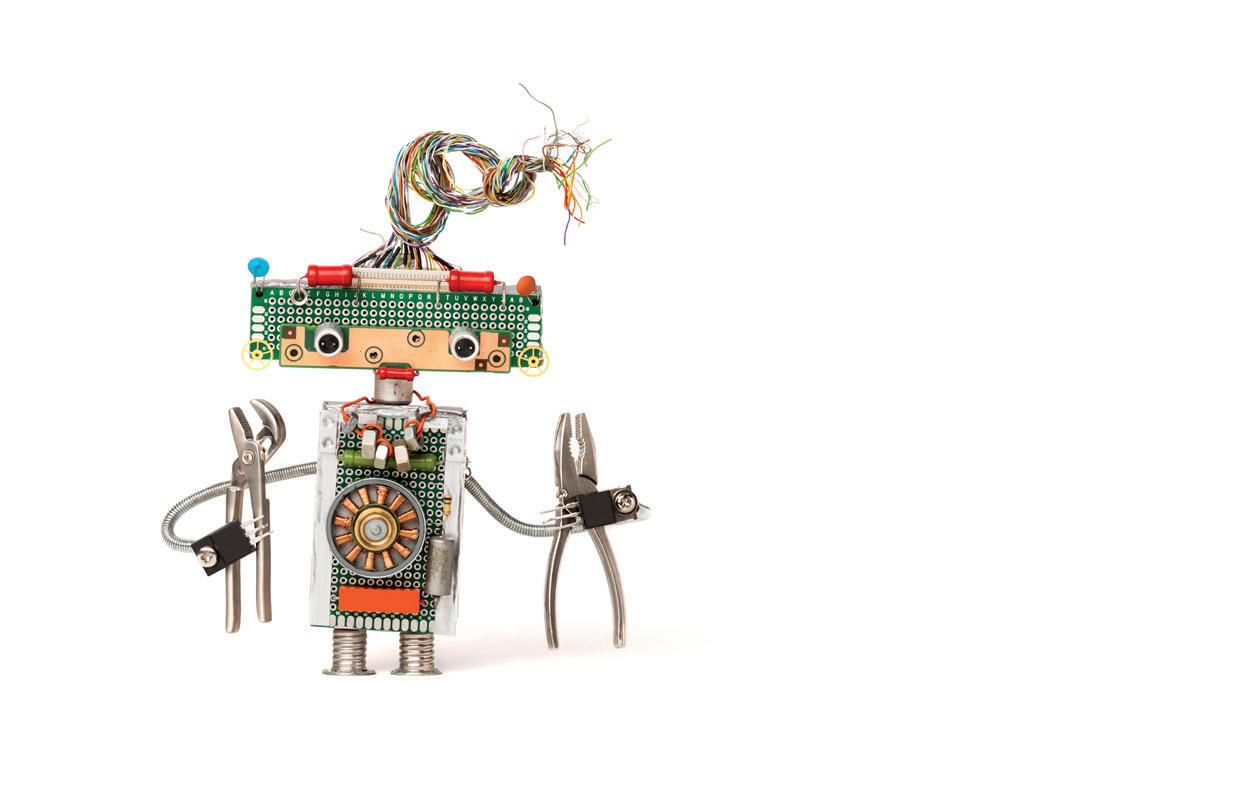
But few would argue that any artificial intelligence has even approached the potential of the human mind because the ability to respond to a question (a stimulus) with a previously known answer (a response) is not a good measure of the kind of intelligence that matters most.
Computers are simply better than we are at that, and yet, we don’t look to the computer to move our civilization forward. Computers are tools. They are hammers, not carpenters. Brushes, not artists. They are “comput-ers,” not “thinkers,” not “philosophers.”
PAGE 1
Computers are tools. They are hammers, not carpenters. Brushes, not artists. They are “computers,” not “thinkers,” not “philosophers.”
The following excerpt is taken from a recent talk Trevor gave to students during a recent assembly.
I’m going to read you a few quotes out of courses on the Delphian program and out of our faculty training materials that came to mind while I was thinking about this. They are the words of Mr. Hubbard: A good grade is supposed to be synonymous with a bright mind. It is actually, under the present system, only a measure of ability to receive and recall data…and no measure of the student’s ability to do anything with the knowledge if ever transplanted into another environment. Taking an artificial intelligence that appears capable of “thought” in one area and transplanting it into another where it can demonstrate similar intelligent “thought” is one of the challenges faced by programmers in this field. It is such a challenge largely because it takes imagination to transfer ability from one area to another, and imagination is what artificial intelligences struggle with the most. In another essay, Mr. Hubbard wrote that: There are men, usually in the fields of the arts and philosophy, who postulate new realities for the social order. Social orders progress or decline in ratio to the number of new realities which are postulated for them. These postulates are made, usually, single-handedly by men of imagination.
Are you seeing a connection between these ideas?
Last quote from Mr. Hubbard:
There are just as many degrees and kinds of intelligence as there are children.
Every one of you has an intelligence, an imagination, that is unique to you.
The most valuable intelligence and the intelligence most unique to human beings is the opposite of the stimulus-response (question/answer) sort of intelligence that computers are so good at.
The most uniquely human intelligence is the ability to take two or more pieces of data, whether previously known or newly observed, and combine them to create something new.
An imperfect word to describe this is simply: Imagination.
This, along with the other concepts I’ve shared with you tonight, got me thinking about how often I exercise the sort of intelligence that is unique to me as a human being.
How often is my imagination engaged? How many of my thoughts and interactions are programmed thoughts and programmed interactions vs. the imaginative, unique thoughts that only I am capable of?
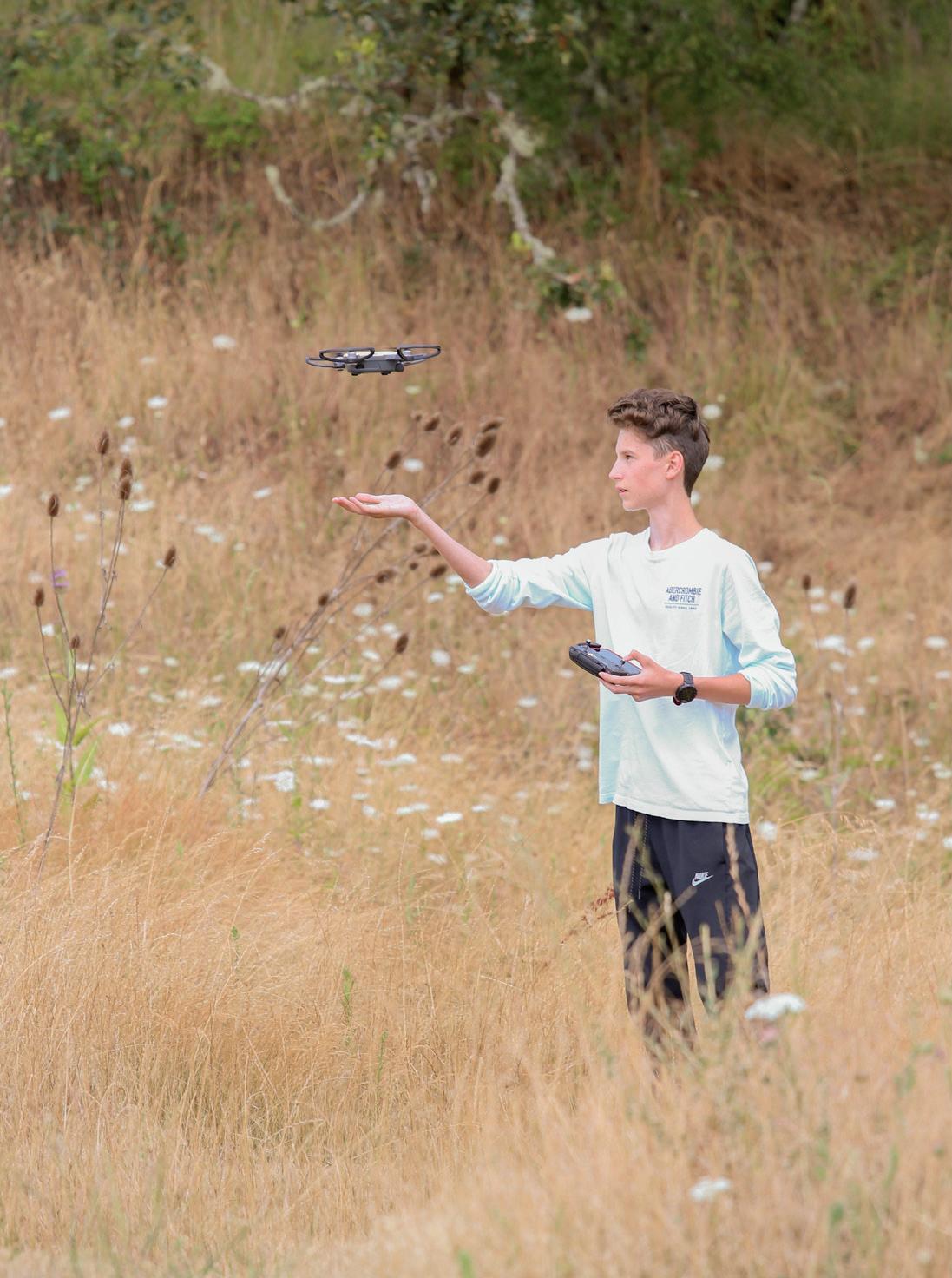
Do you know what I mean?
The truth is that contemplating this was at first a little depressing. I realized that a large percentage of my day is spent uploading the barrage of data and ideas presented to me by others. A large percentage of my day is spent sharing this data and these ideas with others, without having exercised my imagination in the direction of creating something new, even if only a thought, an idea, a conclusion.
I cringe now at how many times I have responded as a computer to a friend’s greeting.
“How are you?” programmed response, “I’m doing pretty well,” (regardless of how I’m actually doing). Insert smile. “How are you?”
This sort of thing passes for human conversation,
PAGE 2
“How are you?” programmed response, “I’m doing pretty well,” (regardless of how I’m actually doing). Insert smile.
“How are you?”
but such conversations are easily replicated by machines.

I could give you a few more examples, but would rather you come up with your own. To help you do that, I’ll ask you a few questions.
How much of OUR day do we spend looking at our phones, our computers, our social media feeds? How much of our day is spent liking the things we’ve been influenced to like and disliking the things we’ve been influenced not to like? How much of OUR day is spent looking for stimulus and then responding in the way we’ve been programmed to respond?
How often does the stimulus we receive also tell us what to think and feel about the information?
Here are some real headlines for you to think about:
“Inside the One Hundred Twenty-Eight Million Dollar Heist that SHOCKED the World and the Chase that Followed”
“Shanghai Metro Sparks COVID PANIC with Festive Red QR Codes”
“People are OUTRAGED by This Jimmy John’s Employee Sign”
“Why People are OUTRAGED Over a Rice Cooking Video”
Or this simple headline, “PEOPLE ARE OUTRAGED!”
How many of us have had our concept of beauty shaped by media or by society rather than by our own thoughts? What about our concept of morality? Of what is good? Of what is evil? Normal?
We are bombarded with data and with both subtle and unsubtle suggestions regarding what we should think about it.
Have you now come up with some examples of your own?
Alright. But I’m now at risk of leaving you depressed. That isn’t what I wanted to do tonight.
Tonight I want to draw your attention to the intelligence that is unique to you. Your imagination and with it, your ability to see, evaluate and make conclusions of your own.
I want you to know that I see it when you exercise it, and I want you to know that doing so is celebrated here at Delphian.
PAGE 3
I see it in your essays. I see it in the wins you share. I see it in the new ideas you come up with on your student council posts. I see it in the art gallery, in the makerspace, in the ceramics studio, and in the murals on the walls. I see it on the basketball and volleyball courts, and on the soccer field. I see it in the way you interact with each other, not as “programs” but as caring, imaginative, and intelligent human beings.
I see it as you dream about and discuss your futures and as you select the goals and purposes you will pursue in life.
Your imagination is what I value most, and like a muscle, it will get stronger with use. I hope tonight’s talk increases your focus on the creation of new ideas—ideas unique to you.
And this finally leads us to integrity. In my opinion, true integrity is too often confused with the “programmed” viewpoints, data, and ideas prevalent in our society. Celebrating as integrity the “programs” that are written by what we see and by what we are exposed to makes us no better than machines.
The intelligence and the integrity I want to celebrate can only be gained through your own unique evaluation of what you see and learn, and through the exercise of your imagination. An idea. A point of view. You will have full ownership of what you create
in this way, and it is your integrity to those things that matters the most to me.
I’m going to close by reading you a message from Alan Larson that was in the Student and Parent Handbook way back in 1983. It is titled “What We Expect of a Student.” It is still what we expect of a student today.
What We Expect of a Student
We expect a student to apply his best efforts to improvement and growth.
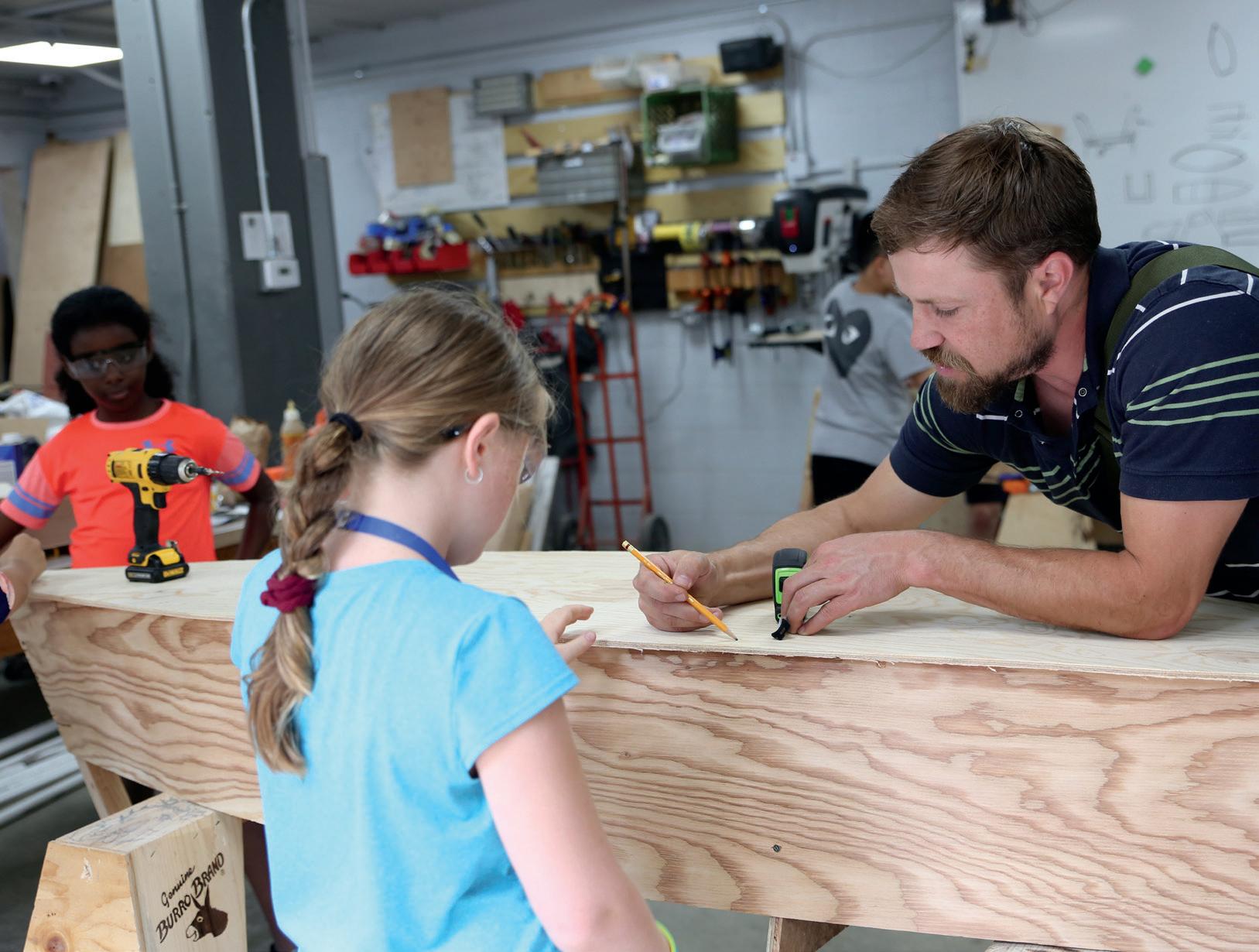
In order for Delphian to be the right school for a student, the student must understand what we mean by improvement and growth and must want them for himself. The family must also understand what we mean by these and want them for a student. Otherwise, we will be working at cross-purposes and none of us will be happy with the results.
We want students who develop positive, dynamic goals and the integrity to pursue them, irrespective of whether they “fit in” or not. We want students who become able to do what is right without worrying whether their peers think it is “square” or not. We may not expect every incoming student to already have these abilities, but we do expect him to want this and to work very diligently and productively to achieve it.
Any leader worth the name has had goals he aspired to and the integrity to hold on to them despite social pressures to “fit in” and not “rock the boat.” Thus, it is not a primary purpose of this school to produce graduates who “fit in.” We have no urge to teach students that “adjusting to their environment” is something to aspire to.
PAGE 4
I want to draw your attention to the intelligence that is unique to you.
If society were not in such a tailspin, morally, productively, and socially, perhaps we would not feel such an urgent need to produce some leadership to help pull it out. However, it is, and we do. We do a service to no one if we allow students to aspire to grow up and go out and “fit in” to a society that is in a tailspin. They must be able to confront changing their lives and their environments for the better. They must have a strong moral grounding and, from that, be able to form and pursue positive goals, with the courage to march to the beat of a different drummer.
This is integrity. It is what we expect our students to develop. They will have the opportunity. It is up to them to seize it.
A student should not come to Delphian seeking a school where he can slip in and quietly obtain a diploma so he can go out and quietly fit into the tailspin.
A student should come to Delphian prepared to become part of a group that is constantly

creating the above viewpoint. He should expect to have his productive viewpoints prized highly. He should aspire to a high ethical level, and welcome the idea that his classmates and the school will expect it of him. It is one of his main contributions to the school. He should understand that the payment of his tuition and fees is basically his entry ticket to the community. From there on, his continued membership depends on his maintenance of a high level of exchange with the group. This will take the form of work projects, helping run the school, maintaining the school, helping his fellows, and—most of all—improving and developing himself.
If the student does that, and we expect it, an enormous amount of learning will occur. And we will have fun while we do it.
Alan Larson Head of School 1976-1991
PAGE 5
ALUMNI WEEKEND
Reunited I

Celebrating the classes of 2010 and 2011

f time flies when you’re having fun, Alumni Weekend is the shortest weekend of the year. That was never more apparent than after missing a year due to the pandemic. This past October we couldn’t help but admire the tight bonds of friendship across generations of alumni. Within minutes of the first alumni arriving on campus, the halls were filled with laughter as familiar faces exchanged hugs. The theme of the weekend, Friends, was appropriate as alumni picked up where they had left off months, years, or decades before.
The weekend kicked off with Alumni Seminars, where students were able to hear graduates give valuable life experience and advice about college and careers. Thank you to all alumni presenters for sharing their time with our student body!
On Friday evening, the Alumni Roast Committee presented a first-of-its-kind double roast of the classes of 2010 and 2011. After getting an extra pandemic year to prepare, the roast was extra toasty. At a delicious Saturday morning brunch, Head of School Trevor Ott and other Delphian executives briefed alumni on the many successes of the school from the previous two years, in addition to revealing plans for the future.
We are already looking forward to our next Alumni Weekend on October 7 - 9, 2022. Airline tickets for October are going on sale soon so book your travel!

We can’t wait to see you at Alumni Weekend!

PAGE 6
“Sometimes you never know the value of a moment until it becomes a memory.”
-Dr. Seuss
CLASS OF 2010

CLASS OF 2011

PAGE 7
ALUMNI WEEKEND

WEEKEND 2021

ALUMNI INTERVIEW
Interview With Alumna Sean Wiggins Find your happy
S
ean Wiggins, a graduate of Delphian’s Class of 1982, has carved out a niche for herself in the music industry. From booking gigs at the Roxy and Troubadour to traveling the country and writing her own music, Sean has done it all, including meeting and overcoming life’s challenges and obstacles head-on along the way.

Delphian Magazine: When you were a student, Delphian was a very new school. What about your experience has stuck with you?
Sean Wiggins: It’s hard to recall exactly, but I do remember what was so awesome was being completely supported in my desire to do music. Without that support, I don’t know if I would have been quite as driven. I was allowed and encouraged to pursue becoming a musician.
PAGE 10
I remember that somehow I managed to do music for almost three hours a day. I was in a band and Craig Bader was our director. I was able to jam with and watch people who were utterly amazing at making music which was so cool and such an inspiration on so many levels.
DM: The music industry is said to be a tough gig. How did you get your start?
SW: My forte, and I think Delphian had a lot to do with it, was to be able to go into my life very sure of myself. I didn’t have a fear of failure and I was very willing to put myself out there. In life you’re hit with all kinds of
obstacles, and rather than give up, I was able to think, “Hmmm, okay. How do I get around this?” Because you could grow with it, stagnate, or decide not to do it anymore.
At one point I was doing weddings, corporate parties, and traveling for all kinds of gigs, and I was doing a bunch of writing and co-writing. But then it all kind of blew up with some changes in my life, so I went solo.
I completely reinvented myself and toured the United States with just me, a guitar, and a harmonica player. From that moment, I was Sean. I wanted to make money from my music. To do that I had to take on a different role.
Now I manage my own bands, write music and have to turn down gigs because we’re so busy. I have fans that request my music. I’ve sold over 10,000 copies of my own CDs and over the last couple of years have been really focused on placements in film and TV.
Last year I made a goal to get over forty placements, which I thought was going to be impossible, but I made a lot more than that.
DM: When reinventing yourself, the hardest part can be taking that leap into the unknown. Would you say you jumped or were pushed into making that change?
SW: Oh, I definitely jumped. My whole life has been a jump!

I never gave up, which would have been very easy because I was making so little money at some points. I was working minimum-wage jobs so I could eat and pay the rent at points. But I always jumped, just constantly looking for the next solution. I had to believe that I wouldn’t always be in that situation.
I think Delphian instills that into you, too. You can be who you want to be and do what you want to do, and Delphian bolstered that for me. That belief was instilled in me, that I was going to be able to do it early on.
DM: That feeling of being in the driver’s seat of your own life is important.
SW: Right, and that’s what it comes down to. You’re not just going to college or into life to be the norm based on

PAGE 11
“You can be who you want to be and do what you want to do, and Delphian bolstered that for me. ”
what society thinks you should do.
Life doesn’t make it easy, and I think you learn a little humility as you go along, but you can’t lose that drive. Delphian is the jumping-off point. The points of the logo, ethics and integrity, and the standards of what is expected from a student really become a part of you.
It’s also a mindset of how to treat other people and how you want to be treated. Not that everyone plays by your rules, but it gives you something to shoot for and you know when something isn’t right.
Life is very different from life at Delphian where you’re up on that hill. It can be a little bit shocking, so you have to look at how you reconcile your beliefs of how things should be with the system, so that you’re living the life you want to live in this world.
And, I think when you maintain that and integrate it into your life that you can rub off on others. You can create your own environment. I think there’s a lot of beauty in that, to have the skill where you can create your own world, how you want to live, and spread it around to the people you’re rubbing elbows with. And hopefully, you can create that with people who aren’t raised the same and don’t come from Delphian.
DM: What advice would you give a current student in getting started on their life journey?
SW: My advice is to start, really honing into your happy. What makes you happy? What are the things that make you smile? How can you turn that into something you can make money from?
I feel so lucky that I get to do what I love to do. Because yes, it’s a job, but I’m not doing a job. I wouldn’t want to be doing anything else. This just makes me smile. It fills my soul.


So take the apprenticeships program really seriously and look for something that makes you smile inside. Test things out and find what brings you joy, because you’re going to be doing it for a long time. Don’t pick what is going to bring you money, but what brings you happiness and then figure out the money from there.

PAGE 12
The Legend of Sleepy Hollow
Presented by the Delphian Theater Department
The Legend of Sleepy Hollow is based on a gothic short story by American author Washington Irving. First published in 1819, the story is set in New York in a quaint Dutch village in 1801.
The inhabitants of Sleepy Hollow are consumed by “local tales, haunted spots, and twilight superstitions” on account of the mysterious occurrences and haunting atmosphere that surround their secluded glen.
Sleepy Hollow’s most famous legend is that of the lightning-stricken tree supposedly haunted by the ghost of a horseman who served the British during the Revolutionary War.
The story begins when Ichabod Crane, the lean, lanky, and superstitious new schoolmaster, first enters town.

When the schoolteacher vies for the hand of the beautiful Katrina Van Tassel, the townsfolk might protest, but it is ultimately the horseman who will decide Ichabod’s fate.

PAGE 13
FALL PLAY
Cast
Ichabod Crane........................................Felix Forslund

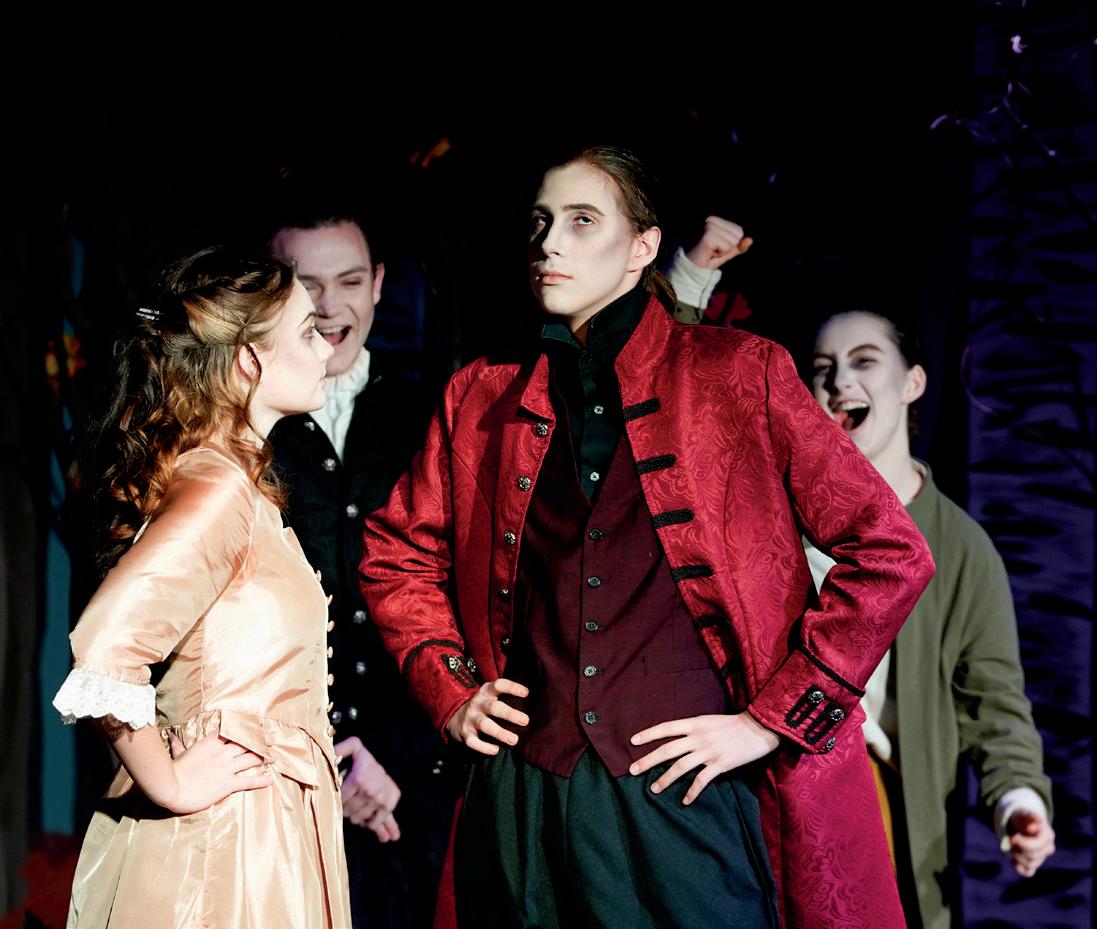
Brom Bones..........................................................Teo King
Katrina Van Tassel.............................................Eliza Swan
Baltus Van Tassel..............................................Odin Vargas
Parson Van Houten.......................................Hailey Ackley
Hans Van Ripper...................................Coco Rose-Coates
The Horseman.............................................Tristan Woods
Villagers........................................................Zoe Forslund
Satori Gailunas
Pennelope Arezzini
Emiliano Chaparro
Ella Feilmeier
Arwen Croman
Crew
Director.............................................Corey Orthmann
Assistant Director.....................................Melissa Agrillo
Production Manager.............................Becka Orthmann
Wardrobe Manager..................................Robin Gailunas
Wardrobe Assistant.................................Vivi Beauregard
Stage Manager........................................Memo Cervantes
Scenic Designer...................................Angelica Wagman

Sound Technician.............................London Whitworth
Lighting Technician....................................Cayden Chen
Acting Coach.................................................Gemma Bell
Makeup & Hair Artists...........................Imogen Dayton
Fancy Hidalgo
Set Construction.............................................Larry Price
PAGE 14
“The Legend of Sleepy Hollow (Heimbuch/Ferguson)” is presented by arrangement with Concord Theatricals on behalf of Samuel French, Inc. www.concordtheatricals.com


FORM COMPLETIONS


Listed in order of completion date since last Delphian Magazine
Beginner 2
Max Silver
Form 1
Yuwa Suzuki
Form 2
Ava Silver
Form 3
Alice Ott
Dublin Baumgardner
Adelaide Kathrein
Destry Hunter
Form 4
Adaline Wolfe
Form 5 Entry
Dawn Robinson
Form 5
Regina Romero-Bolaños
London Schofield
Nathan Cloutier
Upper School International Entry Program

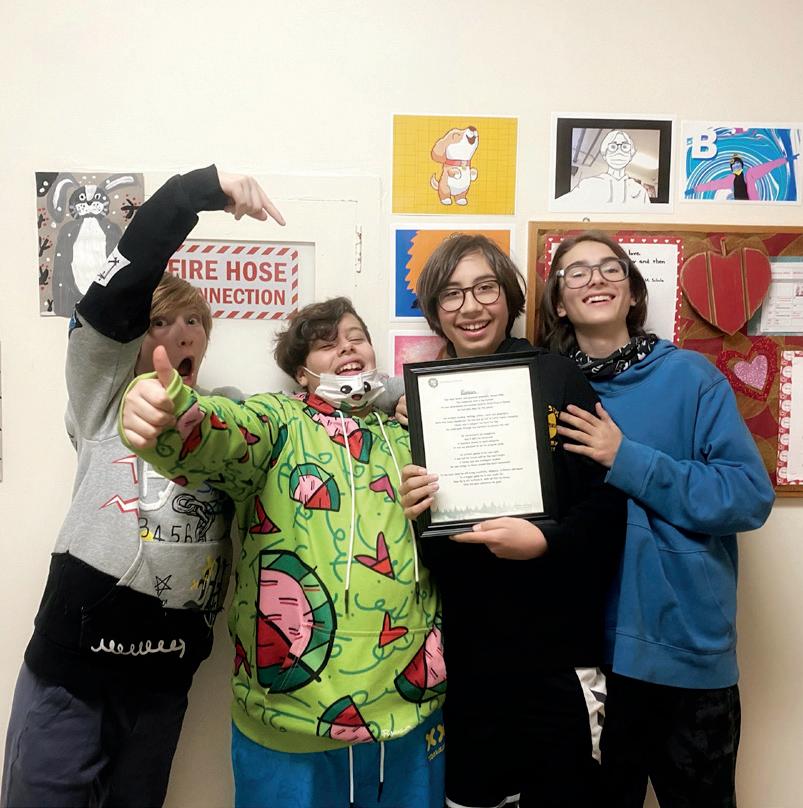
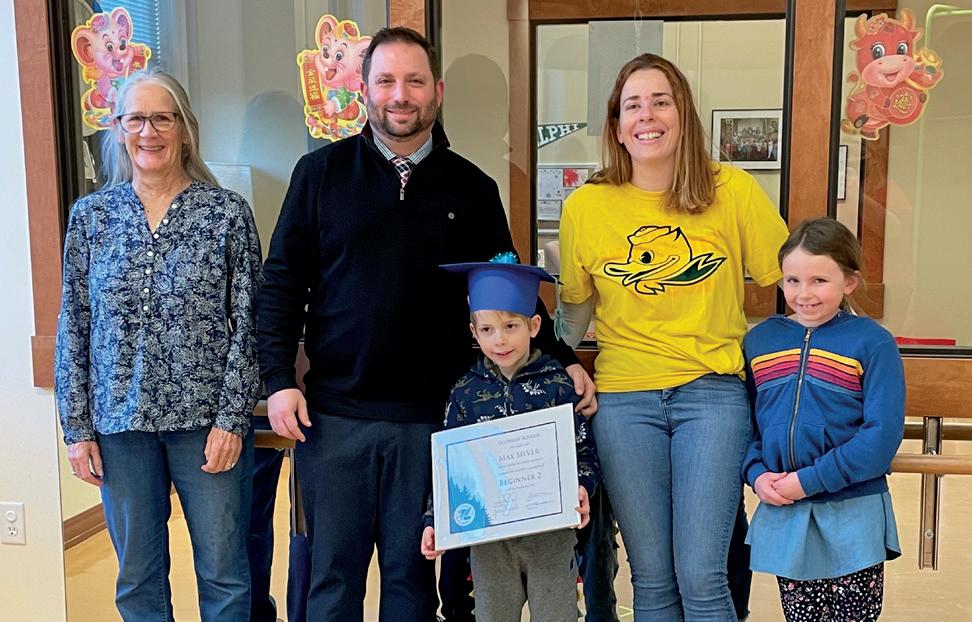
Jim Cao
Carol Ramirez Valdes
Form 6 Entry
Kaylee Vannier
King Kong
Violet McCuen
Johnny Lee
Coco Rose-Coates
Mark de Vries
Cindy Ke
Selina Li
Harlan Gallagher
John Li
Elenora Aji
Roman Peña
Form 6
Arwen Croman
Evans Bi
Samuel Cloutier
Remy Kugler
Paige Bruning
Daphne Anderson
Ashley Arruda
Elissa Hamilton Hansen
Form 7
Chloe Latch
Carson Wagner
Felix Forslund
Ananya Tare
Hannah Weinstein
Evie Xia
Martha Cervantes
Minghan Cui
Danshi Li

Tiger Shang
Daniel Cox
Gemma Bell
Sanjana Garlapati
Sarah Kasprzyk
Natalia Goodman
Brody Workman
PAGE 16
ALUMNI NEWS
2021 and was welcomed home by older sisters Khaliah, Lyla, and Iris.

Erin (Glenski) Lequin (2001) and husband Damon on the birth of their son Hudson Ray Lequin on December 12, 2021. Erin and Damon are both Delphian School staff and looking forward to the day Hudson is old enough to enroll in the Lower School.



Congratulations to

Do you have news?
We love to hear from our alumni! Let us know what you are up to. Email our editor at: magazine@delphian.org or message us on social media to be published in the next issue.
PAGE 17
alumna
Congratulations to alumni Nicole (Danko) Haskin (2013) and husband Theron Haskin (2011) on the birth of their son Jasper Michael Haskin on December 24, 2021.
Congratulations to alumna Sarah (Wiley) Stewart and husband Cedric on the birth of their son Liam Cedric James Stewart. He was born on November 6,
Congratulations to alumna Amy (Kathrein) Hanses (1996) and husband Matt on the birth of their son Jett Alexander Hanses on June 6, 2021. He was welcomed home by older sisters Rhythm and Skye.
Congratulations to Ally (Voss) Myers (2017) and Lucas Myers on their wedding on June 26, 2021. Ally’s sister and fellow alumna Jessica Voss (2014) was Maid of Honor.



Non-Profit Org U.S. POSTAGE PAID McMinnville, OR Permit #7 Delphian School 20950 SW Rock Creek Road, Sheridan, Oregon 97378 503.843.3521| 800.626.6610 | info@delphian.org | www.delphian.org EARN UP TO $1,000 DELPHIAN REFERRAL BONUS! Refer a NEW student to Delphian. Contact admissions regarding your referral at 800.626.6610 or info@delphian.org















































